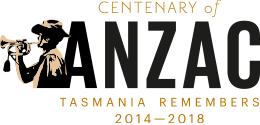Conscription questioned
“Defeat is the one curse worse than conscription”
– Private Albert Blackmore, 29 November 1917.
Conscription was a divisive issue.
Private Albert Robert Blackmore was a brother-in-law of Senator John Earle, a former Premier of Tasmania. Senator Earle supported conscription and was so outraged by the debate he resigned from the Labor Party to join the Nationalist Party, along with Prime Minister William Hughes.
Private Blackmore was a talented school master and writer who wrote and published a book of verse Shade and Echo in 1909.
Before enlisting, Private Blackmore was in charge of the Adventure Bay School on Bruny Island and was one of six Bruny Island recruits who passed the medical examinations held at the Alonnah Public Hall on 8 March 1916. Ten days later Private Blackmore was accorded a public farewell at Adventure Bay and presented with a fountain pen by Councillor Ernest H. Pybus.
Private Blackmore enlisted on 1 May 1916 at age 29 years and 11 months with the 12th Battalion.
While on war service, Private Blackmore found writing helped “untangle ideas”. On 29 November 1917 he wrote to his sister, Suzanna, the wife of Senator Earle, and expressed his views about conscription.
“…military experts are openly questioning the ability of our battering ram tactics. There are, at least, were, sound reasons for conscription but I do not think true the assertion it will make our lot lighter. The more quickly our battalions are filled the more stunts (battles) we shall do.
If I should end up voting for it (conscription), it will be for its moral effect – now that the beastly question has been raised again…. I would vote gladly enough for conscription if it would end the war by a day or send back to Australia the men who have been in it all through; but it will do neither….the more one sees of militarism, the more one hates, fears and distrusts it.”
Private Blackmore served in France where he was wounded twice and gassed twice on 17 August 1917. He was also wounded in action and gassed in Belgium on 2 October 1917. On 27 July 1918, he was wounded in action for a third time, this time in the leg and buttocks.
On 7 August 1918 Private Blackmore embarked for England and arrived at Littlemoor Camp on 23 September 1918 and was sent to hospital on 27 September 1918. Private Blackmore did not see the end of the war. He died in the Monte Video Hospital, Weymouth, of pneumonia on 2 November 1918 and was buried at the Melcombe Regis Cemetery in Dorset, England.
During the war, Private Blackmore was wounded and gassed but it was clear in his letter to Suzanna on 29 November 1917 that he wanted to survive the war.
“I’m ever so much more in love with life than I was 10 years ago. Don’t want Heaven and its dazzling spiritualties a bit; just the dear old Earth and youth eternal….”
The Bruny Island community was deeply saddened by the death of Private Blackmore. The World, Hobart on 19 November 1918 page 6 reported that news of the death of Private Blackmore “was received on Bruny Island with a feeling of the profoundest regret and evoked expressions of the deepest sympathy for the relatives of so talented and exemplary a young man”.
At the time of Private Blackmore’s death, Bruny Island had lost 21 other young lives to the war.
“ He was only a private soldier,
One of the rank and file;
But a true hearted British soldier
From dear, old Bruny isle” [1]
Private Blackmore was the only son of Mr Thomas and Mrs Louisa Blackmore of ‘Musk Grove’, Nugent, and the husband of Mrs. Myrtle M. Blackmore, of 20 Bath Street, Battery Point.
References
[1] Weekly Courier 21 November 1918 page 31
"Personal mention", World (Hobart, Tas. 1918-1924) Tuesday 19 November 1918 page 6
Australian Government Department of Veterans Affairs "Conscription was too late for Albert Blackmore" Anzac Portal


